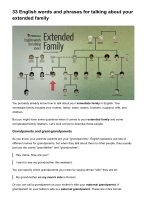Talking about possibility
Bạn đang xem bản rút gọn của tài liệu. Xem và tải ngay bản đầy đủ của tài liệu tại đây (11.85 KB, 1 trang )
Talking about possibility
Can is used to talk about theoretical or general possibility. We do not usually use can to say that something will
actually happen. This meaning is usually expressed by may, might or could.
Glass can be blown. (Theoretical possibility – It is possible to blow glass.)
Wars can break out anytime.
Anybody who wants to can participate in the program.
To talk about future possibilities, we can use will be able or will be possible.
One day, it will be possible to live on the moon.
Future probability
We do not use can to talk about future probability – to say that something will happen. This idea is usually
expressed with may or might. Could is also used in this sense. Note that it shows less probability than may.
It may rain later this evening. (NOT It can rain later this evening.)
There may/might be a strike tomorrow. (NOT There can be a strike a tomorrow.)
Note that may expresses greater possibility than might.
Cannot and may not
Cannot does not mean the same as may not.
Compare:
We may not go camping this summer. (= Perhaps we will not go.)
We cannot go camping this summer. (= It is impossible for us to go camping this summer.)
Logical possibility
We can use can in questions and negatives to talk about logical possibility.
‘There is the door bell?’ ‘Who can it be?’
Can is not usually possible in affirmative sentences with this meaning. Instead, we use could, may or might.
Stay on top of your writing! Download our grammar guide from www.englishgrammar.org to stay up-to-date.
Powered by TCPDF (www.tcpdf.org)









